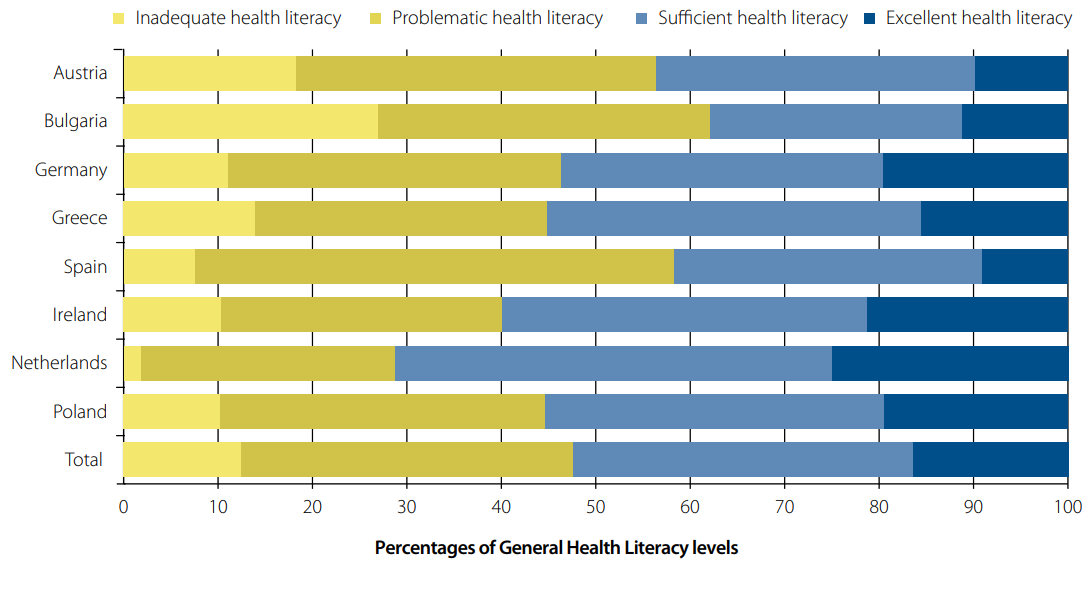Background
M-POHL builds upon WHO´s Health Literacy: The solid facts and the first European Health Literacy Survey (HLS-EU) (2009-2012) which found that an average of 47% of the citizens in the 8 participating countries had limited health literacy. Subsequently, more and more countries set out to measure and improve health literacy. Recommendations called for regular comparative health literacy surveys in Europe in as many countries as possible.

Inspired by a letter from HLS-EU scientists to the ministers of health of Austria, Germany, and Switzerland in 2016, the ministers of these countries, together with their colleagues from Luxembourg and Liechtenstein (Quintet countries), made a joint commitment to support the establishment of regular health literacy surveys in Europe. They implemented a working group to further explore the best way forward and came up with the idea of an action network under the umbrella of the WHO European Region, which received strong support from its European Health Information Initiative.
The inaugural meeting of the resulting M-POHL network took place in Vienna, Austria, in February 2018, followed by a second network meeting in Berne, Switzerland, in August 2018. The 68th meeting of the WHO Regional Committee for Europe (September 2018 Rome, Italy) hosted a technical briefing on health literacy measurement in the WHO European Region.
Vision & aims
The vision of M-POHL is to enhance health literacy in the WHO European Region by ensuring the availability of high-quality and internationally comparative data to support evidence-based political decisions and targeted practice interventions. As described in its Concept Note and the Vienna Statement on the measurement of population and organizational health literacy in Europe, M-POHL’s ambitious aims are to:
support health literacy by strengthening the collaboration between research and policy,
address the health literacy among general population and patients,
institutionalize regular, high-quality internationally comparative population health literacy surveys,
address health literacy-friendliness of systems and organizations,
support assessing organizational health literacy (health literacy-friendly structures and processes), and
foster evidence-based policy and practice.
M-POHL’s umbrella definition of health literacy
Health literacy is a multidimensional concept with overlapping and context-specific definitions. Regarding its projects, M-POHL developed the following umbrella definition of health literacy (based on WHO 1986; Kwan et al. 2006; Parker/Ratzan 2010; Sørensen et al. 2012; The HLS19 Consortium of the WHO Action Network M-POHL 2021; Nutbeam/Muscat 2023):
Health literacy (HL) refers to the extent to which people are able to access, understand, appraise, and apply information in all its forms, communicate about health concerns, and make appropriate use of services to improve their health and well-being, prevent and manage illness, and support others in these matters or make decisions on their behalf.
HL is influenced by the social, cultural, and organizational contexts in which people grow up, learn, work, live, receive care and age. It results from the interaction between personal motivation, individual competencies and the accessibility, understandability, quality and user-friendliness of health-related information and services, and the support available to address health challenges.
M-POHLs first project: HLS19
M-POHL’s first project was the Health Literacy Survey 2019-2021 (HLS19) which was conducted in 17 countries. It demonstrated the relevance of general health literacy and specific health literacies for considerable proportions of adult residents with low health literacies, a social gradient for health literacies, and significant potential effects of health literacies on health-relevant indicators. Based on the HLS19 results, recommendations to improve health literacy were developed.
M-POHL-Projects 2023-2027
M-POHL implemented three projects with a timeline from 2023 – 2027 to ensure that its aims are met:
Project 1: Health Literacy Survey 2024-2026 (HLS24), see Factsheet HLS24 or the HLS24 page for details
Project 2: Assessing Organizational Health Literacy (OHL) Factsheet OHL for details
Project 3: Evidence-based Policy and Practice (EVPOP), see Factsheet EVPOP for details
